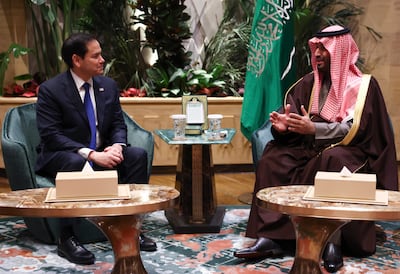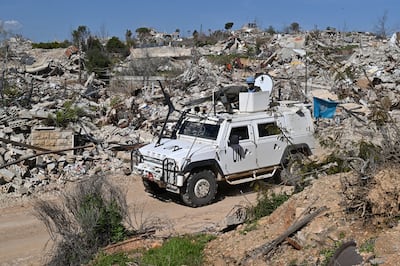One month into President Donald Trump’s second term, the Middle East finds itself balancing between diplomatic progress and the looming threat of renewed wars.
While peace and reconstruction efforts signal a possible path forward, fragile ceasefires and controversial policy proposals could just as easily pull the region back into instability.
The 15-month war between Israel and Hamas has altered regional power dynamics. Iran’s influence has weakened after its proxies in Lebanon and Gaza suffered heavy losses in their conflicts with Israel. Tehran was additionally impacted by the fall of Syrian President Bashar Al Assad’s regime, which severed a crucial land route between Iran and the Lebanese armed group Hezbollah.
Mr Al Assad’s government collapsed following a swift offensive by rebel forces, disrupting Tehran’s strategic reach in the region. After the ousting of Mr Al Assad, Ahmed Al Sharaa has transitioned from leading the Islamist rebel group Hayat Tahrir Al Sham (HTS) in Idlib, under the name of Abu Mohammed Al Jolani, to becoming Syria's interim president.
Mr Al Sharaa and Syria’s new transitional leaders have since engaged in high-level diplomatic efforts, including meetings with international leaders and participation in global conferences, to drum up support for Syria's reconstruction and political stabilisation. His administration emphasises inclusivity and national consensus, aiming to rebuild the country's institutions and restore its standing in the international community.
As part of these efforts, Syria's Foreign Minister Asaad Al Shibani over the weekend attended a high-level meeting on the sidelines of AlUla Conference for Emerging Market Economies organised by Saudi Arabia’s Finance Ministry and the International Monetary Fund (IMF). At the summit, the first of its type, a coalition of Middle Eastern nations, the IMF and the World Bank agreed to form an informal co-ordination group to oversee financial aid and reconstruction efforts, with a particular focus on war-torn Syria, Lebanon and Palestine.
The Syrian civil war has left the country in economic disarray, primarily due to extensive international sanctions imposed on Mr Al Assad's regime. The new interim government has pushed for economic recovery, leading the EU and US to ease some sanctions, particularly in energy and trade, to support reconstruction while maintaining restrictions for stability. However, Syrian officials argue that partial relief is insufficient and are calling for a full removal of sanctions.
Lebanon and Gaza are also in urgent need of foreign assistance for reconstruction following the devastating wars between Israel and Hamas in Gaza, and Israel and Hezbollah in Lebanon. Having international talks on reconstruction in AlUla, instead of a western capital, is one more result of diplomatic gravity moving to the Gulf.
Diplomatic manoeuvring
That’s not all happening in the kingdom. US Secretary of State Marco Rubio arrived in Riyadh on Monday, where discussions with Russian officials took place today with the aim of ending the Ukraine war and repairing ties between the two countries.

Marco Rubio, national security adviser Mike Waltz and Special Envoy Steve Witkoff met with Russian Foreign Minister Sergey Lavrov and Vladimir Putin's foreign affairs adviser Yuri Ushakov in the Saudi capital. Ukraine did not participate.
This comes on the heels of the Munich Security Conference, where European leaders voiced concerns about being excluded from critical discussions that will affect Ukrainian and European security. The absence of both European and Ukrainian representatives from the Riyadh talks has not been well received in Europe. There are growing fears that the US might prioritise its own strategic interests over broader collective security agreements.
“It is relevant and welcome that Saudi Arabia is hosting this first meeting on Ukraine, solidifying Riyadh, and the region, as key players in the emerging global order,” Ana Palacio, a former Spanish foreign minister and a former senior vice president of the World Bank, told The National.
“Europe will remain a key player as negotiations progress and the situation on the ground evolves. Any agreement must not be isolated from the crucial task of reconstruction and the maintenance of progressive stability, including peacekeeping in the traditional sense,” said Ms Palacio. “In the medium term, the EU will need to carefully manage the continuing accession process, with concrete measures that affect both the economy and the well-being of Ukrainians.”
As Saudi Arabia is hosting historic US-Russia talks, the kingdom is solidifying its role as as a key mediator. Talks between Mr Rubio and Saudi officials were also expected to focus on Mr Trump’s proposal for the displacement of Gaza’s Palestinian population from their homeland, with the US president suggesting "owning" the enclave.
Reports emerged ahead of Mr Rubio’s visit that Saudi Arabia is open to mediating between the Trump administration and Iran to bring about a new agreement on Tehran's nuclear programme, according to CNN. This comes after a series of regional shifts, including the weakening of Iran's allies in the Middle East.
“Saudi Arabia is a potential player this time due to its improved economic and diplomatic relations with Tehran,” defence analyst Riad Kahwaji told The National. Saudi Arabia and Iran restored diplomatic ties in March 2023, in a deal brokered by China.
Abdulaziz Sager, founder and chair of the Gulf Research Center, noted that Saudi Arabia's adoption of a neutral stance over the past decade has strengthened its role in international mediation.
"This approach has positioned the kingdom as a credible and impartial facilitator, enabling it to engage effectively in conflict resolution without direct involvement in the disputes themselves."
Region on edge
Despite diplomatic momentum, the Middle East remains precariously balanced. Ceasefires in Gaza and Lebanon are holding for now, but the risk of escalation is ever-present. The Israeli army said that Israel would keep troops in five posts in southern Lebanon beyond the February 18 deadline for its withdrawal from the country.

The announcement came after Lebanese officials expressed concerns that Tuesday’s withdrawal deadline would not be met. “It was clear that the occupation would delay its scheduled withdrawal on February 18, citing the security of the settlements as a pretext to remain in several locations,” an MP from the Hezbollah-Amal bloc told The National.
As for Gaza, Arab officials said that Mr Trump’s vision for the enclave could further fuel regional instability. Mr Trump floated the idea of displacing Palestinians from Gaza earlier this month during an official visit by Israeli Prime Minster Benjamin Netanyahu to Washington. He proposed turning the enclave into the “Riviera of the Middle East” and then suggested that the two million Palestinians who would be displaced under his plan for the US to “own” Gaza would not have the right to return after reconstruction.
Mr Trump’s statements sparked condemnation across the Arab world and much of Europe, with some critics saying the plan would amount to ethnic cleansing. In response, Arab leaders are set to convene a mini-summit in Riyadh later this week to discuss alternatives to Mr Trump’s plan. The summit is expected to include leaders from the six Gulf Co-operation Council nations, along with Egypt and Jordan.
On Monday, the US Republican Senator Lindsey Graham said, after meeting with Mr Netanyahu, that “the one thing that President Trump has done, he started a discussion that was long overdue”, adding that Arab states had “woken up” to the need for an alternative solution for Gaza. A unified Arab stance is expected to emerge from the mini-summit in Riyadh, which will set the stage for another Arab summit in Cairo later on.
“Saudi Arabia is playing a strong and smart geopolitical role, enabling Arab powers to regain their status in the region, particularly vis-a-vis non-Arab players,” said Mr Kahwaji. “Riyadh’s role is crucial in this context, and so far, it has been successful, especially through its partnership with the UAE. We see strong co-ordination between Saudi Arabia, the UAE and Qatar, particularly in navigating and operating in the region’s hotspots."
Amid these developments, experts argue that the Middle East is unlikely to see either lasting peace or full-scale war.
"Given the current US policy, major conflicts are unlikely to be resolved," said Mr Sager. "At the same time, regional actors cannot afford large-scale wars and have little appetite for escalation in the face of ongoing uncertainty."

